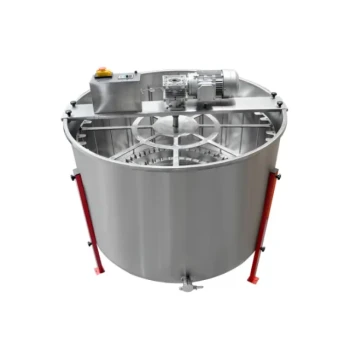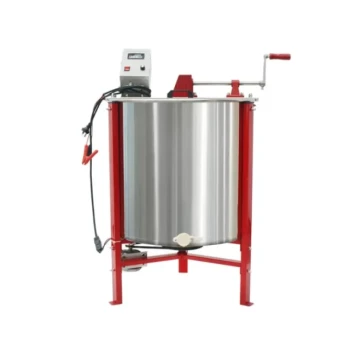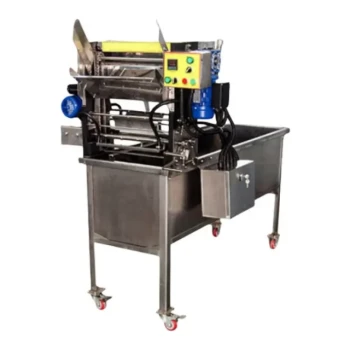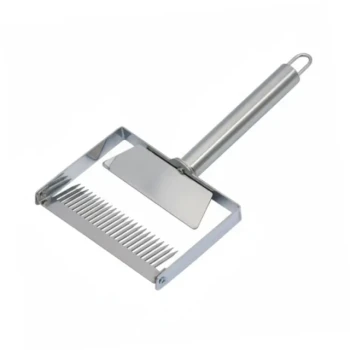The fundamental difference between a manual and an electric honey extractor lies in its power source. A manual extractor uses a hand crank to spin the frames and extract honey, while an electric model uses a motor to do the work for you. This single difference has significant implications for cost, efficiency, and the scale of the beekeeping operation each is suited for.
Choosing between a manual and electric extractor is not just about convenience; it is a strategic decision based on the scale of your operation. Your number of hives and long-term goals will be the deciding factors.
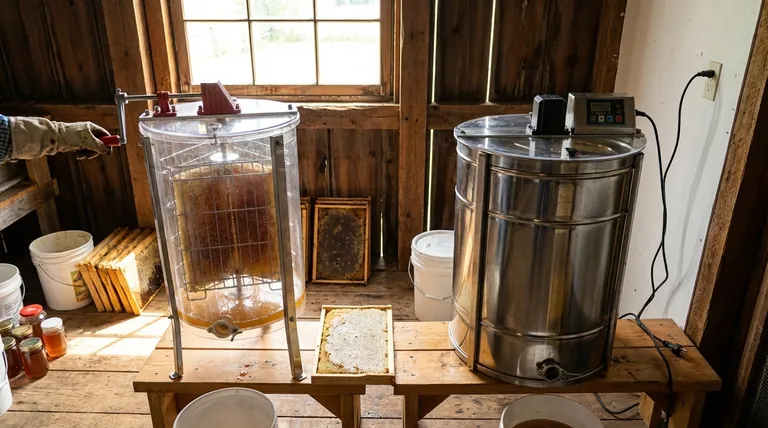
The Core Mechanics: Crank vs. Motor
The goal of any extractor is the same: to spin frames at a high speed, using centrifugal force to pull honey out of the comb without destroying it. How that force is generated is what sets them apart.
How a Manual Extractor Works
A manual extractor is operated entirely by physical effort. You turn a hand crank, which is connected to gears that rotate the internal basket holding the honey frames.
The speed and duration of the spin are controlled directly by how fast and how long you turn the crank. This provides a hands-on process but requires continuous physical labor.
How an Electric Extractor Works
An electric extractor replaces the hand crank and gears with an electric motor. The motor, often with variable speed control, spins the frame basket automatically.
This automation makes the process faster, more consistent, and significantly less labor-intensive. You simply load the frames, set the speed, and turn it on.
Key Decision Factors: Scale, Cost, and Effort
Your choice will ultimately be guided by three practical considerations that directly impact your beekeeping workflow and budget.
The Scale of Your Operation
This is the most critical factor. The number of hives you manage dictates the volume of honey you need to process, making scale the primary driver of your decision.
For a hobbyist with fewer than 10 hives, the volume of honey is manageable for a manual extractor.
For a commercial or serious sideline beekeeper with more than 10 hives, the time and labor saved by an electric model become almost essential.
The Investment: Upfront Cost
There is a clear price difference between the two types. Manual extractors are significantly more affordable, making them an excellent entry point for new beekeepers.
Electric extractors represent a larger upfront investment. However, for larger operations, this cost is often justified by the increase in productivity and reduction in labor costs over time.
The Input: Labor and Time
Extracting honey manually is a slow and physically demanding process. The effort required can become a significant bottleneck, especially as your apiary grows.
Electric extractors dramatically reduce both the time and physical effort needed for extraction. This efficiency allows you to process more honey in less time with minimal fatigue.
Understanding the Trade-offs
Neither option is universally "better"; they are simply tools designed for different purposes. Understanding their specific drawbacks is key to avoiding a poor investment.
The Simplicity of Manual Extractors
The main benefit of a manual extractor is its low cost and independence from a power source, which is ideal for extracting honey in a remote shed or barn.
The primary trade-off is the intense labor and time commitment. What starts as a manageable task with two hives can become an exhausting multi-day project with eight or more.
The Efficiency of Electric Extractors
An electric extractor's advantage is its speed and convenience, turning a laborious chore into a streamlined, automated process.
The trade-offs are the higher initial cost and the requirement for a reliable power source. Without electricity, it is simply a heavy, expensive drum.
Making the Right Choice for Your Apiary
To make a confident decision, align your purchase with the current and future scale of your beekeeping.
- If your primary focus is hobby beekeeping (fewer than 10 hives): A manual extractor is the most cost-effective and practical choice for your needs.
- If your primary focus is growth or commercial production (more than 10 hives): An electric extractor is a necessary investment to save significant time and physical labor.
- If your primary focus is the lowest possible startup cost: A manual extractor offers the most affordable entry into honey extraction.
- If your primary focus is efficiency and maximizing your harvest: An electric extractor will deliver the speed and productivity you require.
Ultimately, the right extractor is one that aligns your equipment with your beekeeping ambitions.
Summary Table:
| Feature | Manual Extractor | Electric Extractor |
|---|---|---|
| Power Source | Hand Crank | Electric Motor |
| Best For | Hobbyists (<10 hives) | Commercial/Sideline (>10 hives) |
| Upfront Cost | Lower | Higher |
| Labor & Time | High physical effort, slower | Minimal effort, faster & automated |
| Key Consideration | Cost-effective for small scale | Efficiency justifies investment for large scale |
Ready to Scale Your Honey Harvest?
Whether you're a growing commercial apiary or a major equipment distributor, choosing the right extraction equipment is crucial for your bottom line. HONESTBEE supplies durable, high-performance manual and electric honey extractors designed for the demands of professional beekeeping.
We help you maximize efficiency and profitability. Contact our wholesale team today to discuss your needs and get a quote.
Visual Guide
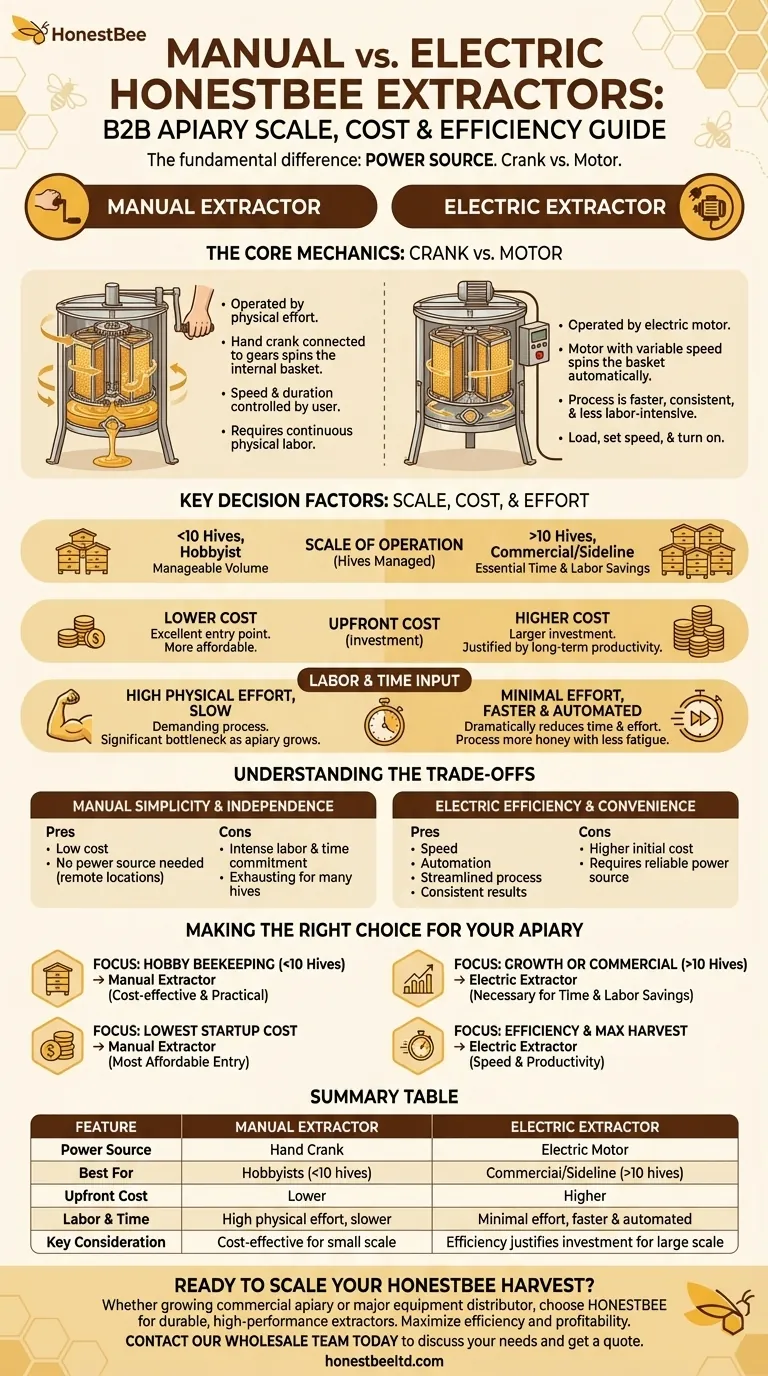
Related Products
- HONESTBEE 3-Frame Manual Acrylic Honey Extractor
- HONESTBEE 72 Frame Industrial Electric Honey Extractor for Beekeeping
- Electric 8 Frame Honey Spinner Extractor Equipment for Beekeeping
- Commercial Electric 12 Frame Honey Extractor Spinner Motorized Honey Extractor
- electric honey extractor honey centrifuge 3 frame honey extractor stainless steel honey frame extractor
People Also Ask
- What is the pressing method for extracting honey? A Simple, Low-Cost Approach for Small-Scale Beekeepers
- What size honey extractor do I need? Match Frame Capacity to Your Hives for Maximum Efficiency
- How do you manually extract honey? Choose the Best Method for Your Hive
- What is the most common method for cleaning a honey extractor? Protect Your Honey & Equipment
- What is the easiest way to extract honey from a honeycomb? A Simple Guide for Beginners






